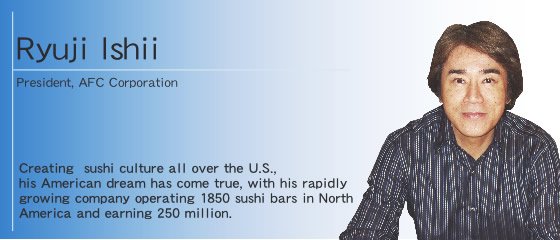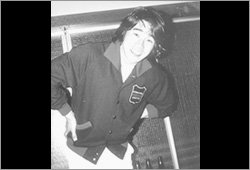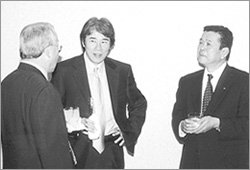YuYu interview Ryuji Ishii
 |
—— What brought you to the US? In my early twenties, I was living in Japan and didn’t have a steady job. I lived like a hippie. I was making a meager living as a part-time jobber (what they now call a "freeter" in Japan), including being a trainer at a gym. Somehow, I got the idea to come to the US, and so I started attending an English language school, as my friend, a translator, recommended. Most of my friends that I met at work or school didn’t have regular jobs. One of them had gone to New Zealand and I planned to go too, but the timing wasn’t right. So a little bit later I came to the U.S. by myself, instead. I am probably here now because of that friend’s influence. Everybody was enjoying his or her youth in those days. I lived a hand-to-mouth existence, with almost no money, but I enjoyed my time. 
陸上部に所属していた中学生時代 (1965)
I lived a totally selfish, free-spirited life, and I had no ambitions. But, as I grew older... I think it was when I reached 23 or so that I started having an ambition to go overseas and do something, including learning to speak English. I didn’t have any particular plans, but I just wanted to come to the US and discover something. Since my early years, I hated doing the same thing as everyone else, or concern myself with what they would do in groups. I didn’t like the way Japanese society was in those days, or the restrictive nature of that society. —— Can you tell us what made you pursue your current career and when you started it? I came to the US in 1977 at the age of 25 and at Creating tended California State University, Dominguez Hills (in Carson), majoring in accounting. I was working for a CPA firm, while attending classes for the CPA exam at night, from which I had to resign later on because I developed a duodenal ulcer. I understood very well that accounting wasn’t for me, but I needed to pursue it to make a living. In those days, many Japanese companies had come to the US, increasing demand for accountants. But, being an accountant was a heavy load for me. I didn’t have confidence; I didn’t like the job anyway. Then I became sick.... So, I got another job in a different field, a Japanese food company that had asked me to join it. That was my first experience of working in the food business. First, I was assigned to do accounting tasks. There was a newly launched franchise division in the company. It was a fast-food restaurant serving Oriental food, a combination of Chinese food and a sushi bar. I was in charge of the franchise business and that was a big problem. I didn’t have any knowledge of the franchise system and neither did any of the staff. So it took me a considerable amount of time to solve many issues. I had a hard time in that division. 
20歳の頃 (1972)
No. I had just become involved in the food business for the first time and didn’t have any ambitions to start anything new. But meanwhile, the company had received a lot of complaints from its franchisees. Why so many complaints? It was because the business was essentially unprofitable. Despite the investment of close to 150,000 dollars, a franchise would have poor performance; it would suffer from poor cash flow, and as a result it would be sold for about half its original price after half a year. I thought it was a very burdensome approach and I felt compelled to come up with a more efficient concept that wouldn’t require much investment. I gave the company’s owner a lot of advice on this division because I believed it needed reform, but all my efforts were in vain and I backed down. As a frequent shopper of supermarkets, I had been fascinated by their deli departments. They reminded me of deli shops in the basement of a Japanese department store. So, I was gradually forming a new idea for sushi, which had already become popular - a takeout service at a supermarket as an addition to delicatessens. Such a casual style wouldn’t require much investment nor impose a burden on the store. I myself didn’t have much money, so I naturally tried to look for ideas that wouldn’t require much investment. —— Do you have any new projects? As far as sushi concepts are concerned, there is no room left for new development in regular supermarket retail. By exploring other retail sites, however, we can create a new market. For example, we have business with grocery stores on U.S. military bases, which has been successful. When I went to Japan recently, I checked some of them out in Yokosuka and Okinawa. In March, we’ll open four sushi bars on U.S. bases in Hawaii, including Pearl Harbor. In addition to sushi, we have started selling a spring roll, an eccentric new item wrapping avocado salad or smoked salmon salad. It’s very popular among women. As health food, sushi and spring rolls have something in common. —— For a certain period of time, you did nothing but work, right? Early on, that was the case. When I just started my business, I wore many hats, oh, I don’t know how many. I had to do everything by myself. At first I couldn’t afford to pay myself a salary. After half a year, I was finally able to have a minimum standard of life. I have come this far, firstly because I have an unshakable confidence in my concepts. That confidence is my strongest asset. And then, passion. Also, I have never given up; I have kept going. That’s another important factor. Two to three years after I started my business, I already had 30 sushi bars. To be honest with you, I thought, “I have done enough. I can now make my living.” I thought I had reached the limit of my potential, because the prevailing perception about sushi in the 1980s was that sushi would sell only at sushi bars in upscale neighborhoods where affluent consumers lived, includ ing those in the costal areas. I didn’t think there was much of a market for sushi, so I didn’t feel like expanding my business. Meanwhile, a man who had been in charge of seafood and sushi bar at a supermarket in San Diego (Advantage Store) was headhunted by another store in San Antonio, Texas. He used to order sushi from us whenever he had a home party, turning all his relatives into sushi lovers. This sushi expert now requested us to open a sushi bar at his new San Antonio store. So I went to the city with my staff for market research, only to find that people there didn’t know much about sushi compared to people in Los Angeles. Realizing it would be too early to open a sushi bar there, I turned down the offer. Moved by his enthusiasm, though, we agreed to open one on a trial basis for three months. This turned out to be a big hit. Our success in San Antonio, whose makeup was different from that of Los Angeles, made me realize that I had underestimated sushi. After that, I started checking out trade magazines and devoted myself to creating a new market in new regions that had potential. To those who believed that sushi would be accepted only in the areas where affluent people lived, I would make a plea with my usual line, "This is my sales performance in San Antonio. Please let me try it once for your store. Then judge how I am doing.” I was burning with ambition in those days. My passion and eagerness, as I look back, were considerable. —— What is your motto?  Many people have asked me that. What do I think? I used to like the word “perseverance,” but I like “passion” now, I guess. Well, I understand that I can rely only on myself Especially in America, everything you do eventually comes back to you. As a business owner, I fully understand that. While you take overall responsibility, you get all the returns if everything goes well, which is wonderful. My company now operates 1850 sushi bars and earns 250 million dollars a year. As a sole business owner, who started with no capital, I needed to overcome quite a few hurdles before achieving such a sales success in our seventeenth year. In addition, I had to struggle alone in America, a foreign land where everything - laws, customs, food culture, etc. - was different. I had to have confidence in the concepts that I designed. While acquiring proficient manpower and organizing them into a team, I always looked forward, had strong determination to carry the tasks through, and developed powerful strategies. All of these were quite challenging! Many people have asked me that. What do I think? I used to like the word “perseverance,” but I like “passion” now, I guess. Well, I understand that I can rely only on myself Especially in America, everything you do eventually comes back to you. As a business owner, I fully understand that. While you take overall responsibility, you get all the returns if everything goes well, which is wonderful. My company now operates 1850 sushi bars and earns 250 million dollars a year. As a sole business owner, who started with no capital, I needed to overcome quite a few hurdles before achieving such a sales success in our seventeenth year. In addition, I had to struggle alone in America, a foreign land where everything - laws, customs, food culture, etc. - was different. I had to have confidence in the concepts that I designed. While acquiring proficient manpower and organizing them into a team, I always looked forward, had strong determination to carry the tasks through, and developed powerful strategies. All of these were quite challenging!I don’t think there are many entrepreneurs like me who have done this much. If I sold my business, I could bring back what my family and I have sacrificed. I know it very well. But I am still full of energy, both mentally and physically. I would say I still have power left. I keep going to see how far I can go. So, I don’t think I try to live according to a motto. Well, to be honest with myself, I guess it's "passion".... —— Can you tell us about some of the positive and negative aspects of living America that you have experienced? The thing that I don’t like about America is that there are always a lot of excuses. Some people don’t admit their laziness or mistakes. Instead, they put the blame on somebody else. I don’t like that. Of course, there also are people who will carry their tasks through when given responsibility. A competent worker smoothly grasps the essence of the task and works fast and efficiently. Many Japanese share such qualities, but I would say Americans may work faster than Japanese. —— Can you tell us about your future ambitions?  I have been working on a new project that I am excited about. We are not ready for its details, but we are determined to make it a success. In collaboration with a major food management company, we wish to actively pursue business with major corporations, well-known universities and colleges, government facilities, and sports facilities. There have been and increasing number of sushi bar competitors, 90% of which are operated by people who once worked for us. A successful concept can’t help having copycats, I guess. Moreover, as for our spring roll, other stores checked it out when we were selling its trial version. They have already started selling similar items. I am of course concerned about our competitors, but they don’t discourage me. The more competitors I have, the more determined I become, looking ahead with pride as a pioneer. I have been working on a new project that I am excited about. We are not ready for its details, but we are determined to make it a success. In collaboration with a major food management company, we wish to actively pursue business with major corporations, well-known universities and colleges, government facilities, and sports facilities. There have been and increasing number of sushi bar competitors, 90% of which are operated by people who once worked for us. A successful concept can’t help having copycats, I guess. Moreover, as for our spring roll, other stores checked it out when we were selling its trial version. They have already started selling similar items. I am of course concerned about our competitors, but they don’t discourage me. The more competitors I have, the more determined I become, looking ahead with pride as a pioneer.—— You’ve already had wealth in hand. Yet, do you keep dreaming? That’s never-ending. Money and dreams are totally different issues. Money isn’t everything. Something other than money compels me to find more business opportunities. I think it’s the romance of business, “a man’s romance.” (03-01-2004 issue) |

